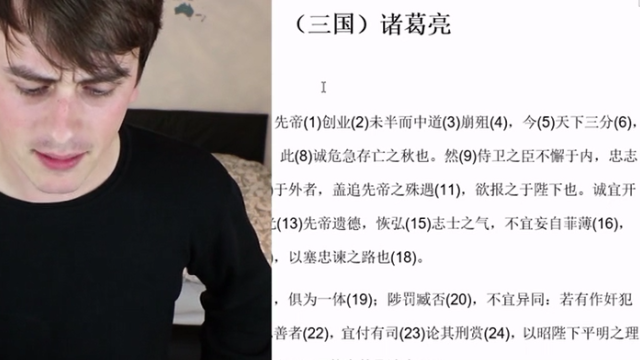音频杂志:二战中的密码战—破译天才的悲剧命运
When you read in English, sometimes you will meet new words. It is a good idea to try to guess the meaning of the unknown words by looking at the context in which they appear before using a dictionary. This way you can become a more proficient reader.
Cryptology
By Paul Millard
Dbo zpv sfbe uijt? Ju’t b tfdsfu dpef! If you don’t understand that, it is because I wrote it in a secret code. It isn’t a very complicated code. I just changed every letter for the one following it in the alphabet. So, ‘b’ is ‘c’, ‘c’ is ‘d’ and so on. Fbtz
Secret codes are not a new idea. They are almost as old as writing itself. We know that the Ancient Egyptians and Greeks used them, as did the Arabs of a thousand years ago. They were especially important in war. Commanders didn’t want the enemy to capture their messages and understand their plans, so they wrote them in code. Of course, the enemy did want to understand the messages, so they would try to find the code, or ‘break’ it.
The Enigma code
As a result, codes became more and more complicated. One of the most famous is the Enigma code, invented by the Germans and used in the Second World War. People believed that it was impossible to break, because it was so clever. The amazing thing about Enigma was that it was always changing. In one message, the letter ‘e’ could be ‘f’, but in another message it could be ‘z’. So, there were millions of possibilities in every coded message.
The first people to attempt to break the code were the Polish, who were concerned about Hitler’s rise to power. A group of mathematicians worked on the Enigma problem. They found out a lot about how it worked, but they couldn’t understand it. When Hitler attacked in 1939, the Poles told the British everything that they knew about the code.
Atlantic danger
Most of the British code-breakers thought that Enigma was unbreakable. They were especially concerned about the Enigma variations used by the German navy. The submarines sent by Hitler to attack ships in the Atlantic were probably the greatest danger faced by the British and American allies in the war. Britain needed food and other essentials from outside, and the Americans needed to send soldiers and supplies safely across the ocean. Without breaking the code, there was little chance of defeating the submarines. Without control of the Atlantic, there was little chance of victory.
Alan Turing, code-breaker
Almost alone, one man began to work on the problem. He was a brilliant young mathematician called Alan Turing. He believed that he could break the code with advanced logic and statistics. However, he needed to make a machine that could do a very large number of calculations very quickly. By improving on the machines that the Poles had made, he built a machine called the ‘Bombe’.
It worked. He broke the Enigma code. The British and Americans could read the messages that were sent to and from Hitler’s submarines. Slowly, the allies won the Battle of the Atlantic. They had freedom to move at sea and could send their armies to liberate Western Europe from Hitler and the Nazis. In 1943, they went to Italy and in 1944 they successfully landed in France. This was the landing shown in the film, ‘Saving Private Ryan’. Without Turing and his code-breaking, the history of Europe and the world could have been very different.
From code-breaking to computer-building
Turing continued working with machines and electronics and in 1944 he talked about ‘building a brain’. Turing had an idea for an electronic ‘universal machine’ that could do any logical task. Soon after the war, he went to work at Manchester University and in 1948 the ‘Manchester Baby’ was born. It was Turing’s second great invention and the world’s first digital computer. When he sent a message from his computer to a telex machine, Alan Turing wrote the first e-mail in history.
So, what happened next in the life of this highly talented man? His great achievements in code-breaking and computing happened in his twenties and thirties. He was still a young man - in the same year that his computer worked for the first time, he nearly ran in the Olympic Games for Britain. We know that he had many ideas to develop in digital computing, quantum physics, biology and philosophy. Sadly, he wasn’t able to work fully on these ideas. Turing’s personal life became more and more problematic.
A genius under attack
Alan Turing was a homosexual. Nowadays, this is legal and widely accepted in Britain and most other Western countries. Fifty years ago, it was a very different story, and people were sent to prison for homosexual acts. Turing had to stop doing code-breaking work for the British government because his homosexuality was a ‘security risk’. This hurt and angered him, especially as it hadn’t been a problem in the war years. Increasingly, Turing refused to hide his homosexuality, believing that there was nothing wrong with him. Perhaps he felt that he deserved individual freedom, having done so much for freedom in the world.
Finally, he was arrested by the police and in March 1952 he was found guilty at a criminal trial. He wasn’t sent to prison – instead he was injected with the female hormone, oestrogen, in an attempt to stop his homosexual behaviour.
A tragic end
Two years later, Alan Turing was dead. He killed himself by eating an apple containing the poison, cyanide. The apple - the symbol of the physics of Newton, of forbidden love, of knowledge itself - became the symbol of tragic death.
For many years, Turing was a forgotten hero. Now, more than fifty years after his death, more and more people are learning of his work in war and in peace. The BBC made a television programme about him. Some years ago, a statue designed by Glyn Hughes was put up in a small park in Manchester. It is of Turing, sitting on a park bench, with an apple in his hand. The money for the statue mostly came from individual people who wanted to remember him. No money came from the British government or any major computer company, despite the great work that Turing had done for them.
It is a wonderful memorial, but perhaps a greater memorial is that you are reading this now because of Turing’s computing work, and that I could write it in a democratic country in Western Europe.
【小编】大家听说过 Enigma吗?Enigma源自于希腊文,指的是是战争时期所用的密码(在所有用于军事和外交的密码里,最著名的恐怕应属第二次世界大战中德国方面使用的ENIGMA)。由于英美联军无法破译德国的密码,导致军事行动节节败退。然而,一位传奇的年轻人,阿兰图灵成功地利用强大的电脑逻辑计算破译了这些密码!如果没有图灵的成功,或许二战的结果会截然不同哦!
可是这位天才的命运却是个悲剧,阿兰图灵是同性恋者。在50年前,同性恋者是不被社会接受的……由于不堪压力,最后图灵食用了含氰化物的毒苹果自杀。这是西方历史上一个巨大的遗憾。
- 相关热点:
- 上海理工大学











